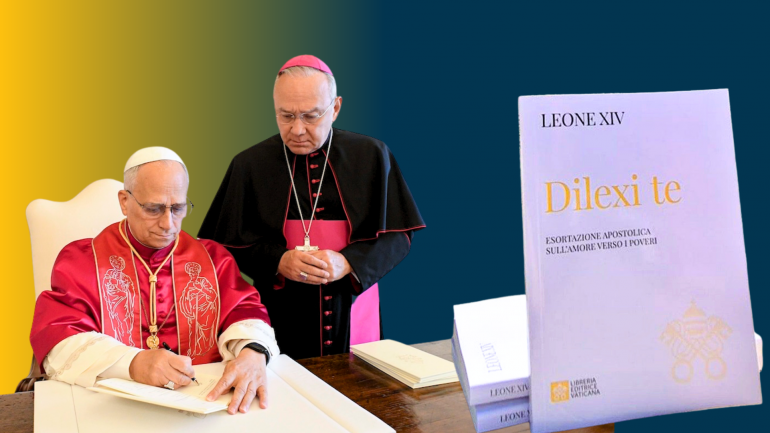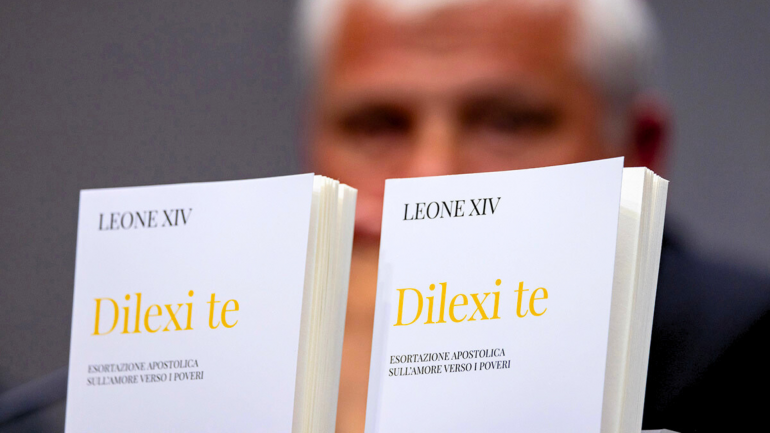10 Takeaways from Dilexi Te

When I first heard that Pope Leo XIV was preparing to release his first Apostolic Exhortation, I was curious. What tone would his pontificate take? Would he continue the legacy of Pope Francis or chart a new course?
Then I saw the title: Dilexi Te, “I Have Loved You.” Instantly, it felt different. This wasn’t just another official Church document. It felt personal, a letter written with love, shaped by the hearts of two Popes.
In the introduction, Pope Leo explains that Pope Francis had begun the text before his passing. Pope Leo completed it, blending his reflections with those of his “beloved predecessor.”
I’ve only skimmed it so far; it deserves a slow, prayerful reading, but even that first look was moving. Dilexi Te is beautiful, challenging, and deeply hopeful.
Here are ten key takeaways that struck me.
1. To Love God Is to Love the Poor
“Love for the Lord, then, is one with love for the poor… contact with those who are lowly and powerless is a fundamental way of encountering the Lord of history.” (Par. 5)
This is the heart of Dilexi Te. Pope Leo doesn’t present love for the poor as optional or reserved for those in social work. He insists that to love God means to love the poor, not out of guilt or duty, but because that is where Christ is found. This love is the true measure of discipleship.
2. God’s Preferential Love Is About Justice, Not Exclusion
“This preference never indicates exclusivity… It emphasizes God’s compassion toward the poverty and weakness of all humanity.” (Par. 16)
Many misunderstand the “preferential option for the poor” as favoritism. Pope Leo clarifies: God’s preference is not exclusion, but justice. Like a loving parent who turns first to a wounded child, God’s heart bends toward those who suffer most.
3. There Are Many Forms of Poverty
Dilexi Te expands the meaning of poverty. Beyond material deprivation, Pope Leo names:
-
Moral and spiritual poverty
-
Social exclusion and discrimination
-
Cultural alienation
-
Illness and vulnerability
-
Loss of freedom and dignity
This is a call to awareness. Many live with hidden poverty, emotional, spiritual, or relational. True Christian love notices and responds to these unseen wounds.

4. The Poor Evangelize Us
“The poor are not simply the object of our charity, they are agents of evangelization who help us rediscover what really matters.” (Par. 44)
We often think evangelization means what we do for others. Pope Leo flips that. The poor evangelize us through their perseverance, faith, and dignity amid suffering. Their witness leads us to conversion and brings us back to the heart of the Gospel.
5. Love Is Liturgical
“When the Church kneels beside a leper… she fulfills her deepest vocation: to love the Lord where he is most disfigured.” (Par. 52)
Acts of mercy, visiting the sick, feeding the hungry, comforting the dying, are not separate from worship; they are worship. Pope Leo reminds us that holiness isn’t confined to candles and hymns, but lived out in hospital wards, soup kitchens, prisons, and street corners.
6. Education Is a Right, Not a Favor
“For the Christian faith, the education of the poor is not a favor, but a duty.” (Par. 72)
Helping someone access education isn’t an act of kindness; it’s an act of justice. Education upholds human dignity, and denying it is a form of oppression. Supporting schools, mentoring youth, and sharing knowledge are part of our Christian responsibility.
7. Migrants Are the Face of Christ
“Where the world sees threats, she (the Church) sees children… in every rejected migrant, it is Christ himself who knocks at the door.” (Par. 75)
Here Pope Leo echoes Pope Francis, and powerfully so. The Church cannot credibly preach the Gospel while ignoring the suffering of migrants and refugees. To turn them away is to turn Christ away. Welcoming the stranger is not politics; it’s faith in action.
8. Love Must Be Real and Courageous
“Christian love breaks down every barrier, brings close those who were distant, unites strangers, and reconciles enemies… A Church that sets no limits to love, that knows no enemies to fight but only people to love, is the Church the world needs today.” (Par. 20)
Pope Leo insists that genuine love is not sentimental but grounded in reality. It listens to the wisdom that comes from the margins, from the laity, the poor, and those living faith amid struggle. These voices keep the Church honest, humble, and human.
9. The Margins Are the New Centre
“Reality is best viewed from the sidelines, and the poor possess unique insights indispensable to the Church.” (Par. 82)
Pope Leo challenges us to see that the Church’s best insights come not from the powerful, but from those on the peripheries. The poor, the wounded, and those serving among them offer perspectives that shape authentic faith. Their voices are not optional; they are essential.
10. We Can’t Wait Until Tomorrow
“The dignity of every human person must be respected today, not tomorrow.” (Par. 92)
This closing appeal is urgent. Pope Leo anticipates excuses, “It’s complicated,” “We need more time,” but refuses to delay. Justice postponed is justice denied. Love demands action now: helping a neighbor, speaking against injustice, standing with the forgotten.
Dilexi Te is both a continuation of Pope Francis’ compassion and a bold affirmation of Pope Leo’s vision, a Church that listens, loves, and walks with the poor.
It reminds us that Christianity isn’t an idea; it’s a way of loving. And love, as Pope Leo reminds us, “is not something to admire from afar. It is something to live.”
(Lavoisier Fernandes, an Indian freelancer based in London, U.K., contributes regularly to Catholic magazines and media platforms.)










- Reply
Permalink